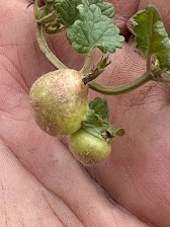


100th Issue of Permaculture Magazine
will be released to subscribers in:
soon!























paul wheaton wrote:
My response was to put a string of electric around the blackberries and then run pigs in there.
My project thread
Agriculture collects solar energy two-dimensionally; but silviculture collects it three dimensionally.




Susan Monroe wrote:
The trouble is going to be keeping them down. I think it was in one of Bill Mollison's books where he reported that a farmer had a gully full of wild blackberry plants that he wanted cleaned out. He threw bales of hay into the gully and gave his cattle access. They chewed down and trampled the vines while going after the hay. As soon as he saw the vines coming up again, he threw more hay down there. After 30 years, he admitted that the blackberries were winning.
Sue
My project thread
Agriculture collects solar energy two-dimensionally; but silviculture collects it three dimensionally.
 2
2








gordwelch wrote:I agree with the stomp on 'em advice, but then cutting them up? Put a goat out there, even one or two and they'll eat all the leaves. Eat the goat. And repeat the following year. If you need to, the third year you can do it again. Goats prefer blackberries over all other plants pretty much.
One issue that doesn't seem to have been discussed is that blackberries are filling a tremendous void in their ecosystem. They pretty much grow only in grown up pasture, roadsides, and abandoned railways... so they are filling a void. And they don't last long... about ten years on they finish their job and other, more diversified species take over. Blackberries are a kind of pioneer species that are filling in voids that humans have created.
I would like to know what the NW looked like before white folks showed up...
My project thread
Agriculture collects solar energy two-dimensionally; but silviculture collects it three dimensionally.




gordwelch wrote:One issue that doesn't seem to have been discussed is that blackberries are filling a tremendous void in their ecosystem. They pretty much grow only in grown up pasture, roadsides, and abandoned railways... so they are filling a void. And they don't last long... about ten years on they finish their job and other, more diversified species take over. Blackberries are a kind of pioneer species that are filling in voids that humans have created.
I would like to know what the NW looked like before white folks showed up...
 2
2




Susan Monroe wrote:
I think it was in one of Bill Mollison's books where he reported that a farmer had a gully full of wild blackberry plants that he wanted cleaned out. He threw bales of hay into the gully and gave his cattle access. They chewed down and trampled the vines while going after the hay. As soon as he saw the vines coming up again, he threw more hay down there. After 30 years, he admitted that the blackberries were winning.
Sue
My project thread
Agriculture collects solar energy two-dimensionally; but silviculture collects it three dimensionally.

|
Willie Smits understands 40 languages. This tiny ad knows only one:
Learn Permaculture through a little hard work
https://wheaton-labs.com/bootcamp
|






